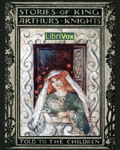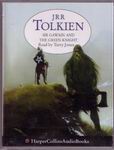
 Blood of Ambrose
Blood of Ambrose
By James Enge; Read by Jay Snyder
Audible Download – 14 hours 29 mins [UNABRIDGED]
Publisher: Audible Frontiers
Published: 2009
Themes: / Fantasy / High Fantasy / Arthurian Legend / Sword and Sorcery / Necromancy / Regency / Immortality /
In his introduction to the Audible Frontiers recording of Blood of Ambrose, James Enge places his debut novel in the “swords and sorcery” fantasy sub-genre. While the work certainly fulfills the expectations established by that label–it’s replete with feats of arms, dark conjurings, and roguish characters–it also owes debts to the Arthurian tradition and to humorous fantasy in the vein of David Eddings and Joe Abercrombie. The resulting mélange of tropes and styles sometimes clashes, but in the end it leaves the reader with a varied and satisfying reading experience.
The blurb from Pyr, who publishes the hardcopy edition, reads as follows:
Centuries after the death of Uthar the Great, the throne of the Ontilian Empire lies vacant. The late emperor’s brother-in-law and murderer, Lord Urdhven, appoints himself Protector to his nephew, young King Lathmar VII and sets out to kill anyone who stands between himself and mastery of the empire, including (if he can manage it) the king himself and his ancient but still formidable ancestress, Ambrosia Viviana.
When Ambrosia is accused of witchcraft and put to trial by combat, she is forced to play her trump card and call on her brother, Morlock Ambrosius—stateless person, master of all magical makers, deadly swordsman, and hopeless drunk.
As ministers of the king, they carry on the battle, magical and mundane, against the Protector and his shadowy patron. But all their struggles will be wasted unless the young king finds the strength to rule in his own right and his own name.
With names like Uthar and Viviana, even the most casual scholar of Arthuriana will recognize several connections to that illustrious tradition. Even the book’s title, Blood of Ambrose, is an allusion to Arthur, since in some medieval texts King Arthur is sometimes conflated with the late Roman British official Ambrosius Aurelianus. Though the novel is set in a seemingly fictional realm, tantalizing connections to our own world fleetingly appear, including overt references to the Latin tongue and to Britain itself. The relationship between the Ontilian Empire and our own past, however, is never fully explored. While Enge asserts that Blood of Ambrose serves up a completely self-contained story, he certainly leaves room for future world-building.
King Lathmar VII, as the above blurb suggests, is ostensibly the novel’s protagonist. Seen in this light, Blood of Ambrose is a coming-of-age story, and in this capacity it succeeds beautifully. In the book’s early hours, Lathmar is tossed around “like a sack of beans,” as he says, but by book’s end he’s making his own decisions and asserting his rightful authority. His relationship with the other characters are fraught with ambivalence and ambiguity.
The novel’s shining star, though, is the almost-immortal Morlock, who epitomizes the paradoxical swords-and-sorcery antihero. On the one hand, he’s valiant, protective, and very kind to Lathmar. Yet at times he is prone to violent outbursts or spells of depression. In a unique twist, we’re also told that he’s had a drinking problem in the past, and his refusal to let spirits pass his lips recurs as a frequent talking point among the other characters.
Unfortunately, the novel’s plot isn’t on par with its vibrant characters. Blood of Ambrose certainly tells some thrilling, engaging, and poignant stories, but they work better as standalone adventures rather than building a unified edifice. Characters like Lathmar, Morlock, and the arch-villain poisoner Steng serve as unifying threads, but the plot simply lacked the momentous drive to keep me interested in what would happen next. Luckily, the character development was strong enough to provide me with that forward impetus.
Jay Snyder’s reading of Blood of Ambrose is mostly run-of-the-mill, with one significant exception. His resonant, laconic, intentionally dead-pan portrayal as Morlock transcends mere performance. This is how a flesh-and-blood Morlock really would speak. Seldom in my experience listening to audiobooks has a character been so indelibly linked to the narrator who gives him voice. Snyder’s depiction of Lathmar also deserves note; the transition from tremulous stuttering to firm command mirrors the development of the young king. His rendition of the tempermental Ambrosia is less flattering, and her outbursts can grate on the listener’s ears like claws. Of course, that may well be intentional.
Though it tells a rather lackluster story, Blood of Ambrose introduces a fascinating settting populated by a host of multi-faceted characters. It’s my hope that James Enge will continue to work and play with this colorful palette.
Posted by Seth Wilson


 There’s an upcoming five part “surreal” Fantasy radio drama starting on BBC Radio 4 next week. Be sure to add it to your Radio Downloader subscriptions. It airs during the oddly named “Woman’s Hour Drama” slot. Sez BBC:
There’s an upcoming five part “surreal” Fantasy radio drama starting on BBC Radio 4 next week. Be sure to add it to your Radio Downloader subscriptions. It airs during the oddly named “Woman’s Hour Drama” slot. Sez BBC: The Quest
The Quest

 Blood of Ambrose
Blood of Ambrose

